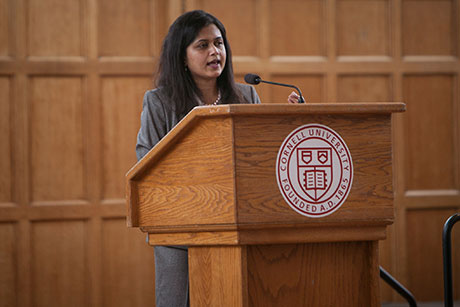Law professor takes on international misogyny in keynote
By Owen Lubozynski

“By show of hands, how many people know that in December 2012 a woman was raped by local men on a bus in Delhi and later died from her wounds?” Sital Kalantry asked her audience, all of whom raised their hands. “How many people know that there are ‘missing women’ in India and that selective abortion of female fetuses is said to be responsible for the missing women?” Most raised their hands. “How many people know that the majority of the U.S. Congress in 2012 passed a law prohibiting sex-selective abortion because they believed that … Asian-Americans are selectively aborting female fetuses?” No hands went up.
Kalantry, clinical professor of law, was delivering the keynote speech at Cornell University’s International Women’s Day banquet March 15. She drew attention to the intersection of sexual discrimination and racial discrimination against Asian-Americans in the U.S. Her primary focus was legal prohibitions on sex-selective abortions proliferating in this country, where eight state legislatures have banned sex-selective abortions and 21 states, along with the federal government, have considered such bans. The discourse surrounding these bans, she observed, has centered on the belief that Asian-American immigrants, motivated by son preference, are seeking these abortions.
The main empirical support for this belief is a 2008 study by economists Douglas Almond and Lena Edlund. Kalantry and her co-authors, however, did their own study, published last year, that contradicts Almond and Edlund’s findings and challenges the conclusions drawn from them. In “Replacing Myths with Facts: Sex-Selective Abortion Laws in the United States,” the authors found that, when all their sample families’ births were taken into account, the sex ratios of foreign-born Chinese, Indians and Koreans were not male-biased.
Kalantry observed that, while she could find no correlation between the growth of Asian immigrant populations in any given state and the likelihood of that state adopting a ban on sex-selective abortion, she did find a strong correlation between the adoption of such bans and the presence of other abortion restrictions. Noting that the result of the trend is increased scrutiny on Asian-Americans seeking abortions as well as more obstacles for all U.S. women seeking reproductive services, she said, “[Asian-Americans] are just being used as scapegoats for an anti-abortion agenda.”
Kalantry then turned to the “dominance theory” interpretation of gender relations in India, an approach that situates sex selection as part of a pervasive cycle of violence by male oppressors against female victims. As an illustration of the theory’s limitations, she discussed the controversial BBC documentary “India’s Daughter,” which examines the circumstances and aftermath of the 2012 gang rape of medical student Jyoti Singh on a bus in Delhi. The Indian government has banned the film, and critics have claimed that it incites violence and feeds the stereotype of an India steeped in misogyny.
This criticism, Kalantry argued, ignores the film’s interviews with those who knew Singh. This material, she said, portrays a brave woman challenging traditional gender norms – a member of the emerging Indian middle class that is increasingly progressive. “Instead of spending resources in suppressing the misogynist views expressed in the documentary,” said Kalantry, “the Indian government should work on changing them by investing in quality education and taking better measures to protect women who are increasingly claiming their equality with men.”
Kalantry concluded by emphasizing the complicated and layered gender dynamics in India and urging her audience to “shed the lens that is only informed by one theory of gender relations and focus your gaze not just on the global but also the local.”
Owen Lubozynski is a writer for the Law School.
Media Contact
Get Cornell news delivered right to your inbox.
Subscribe